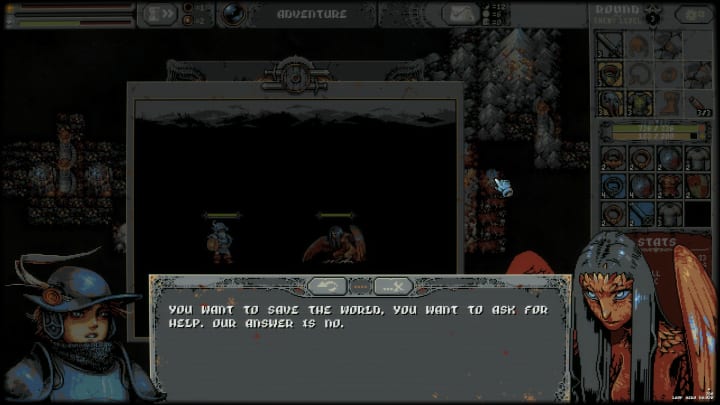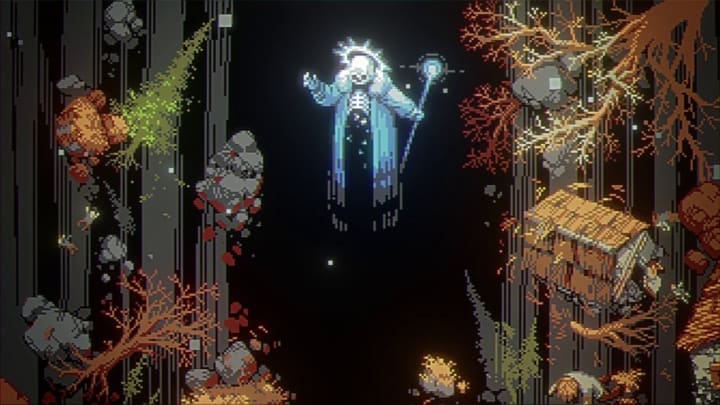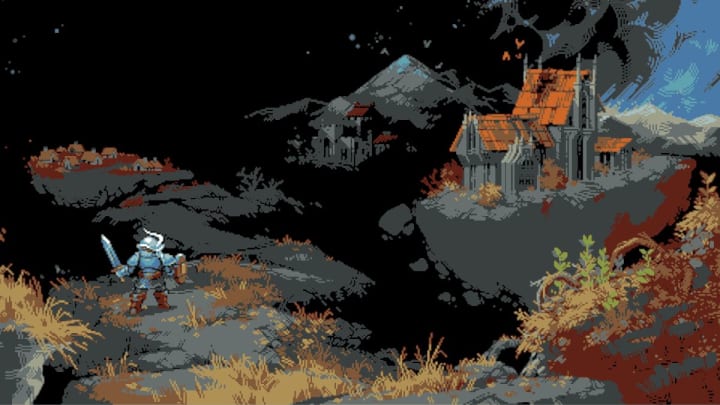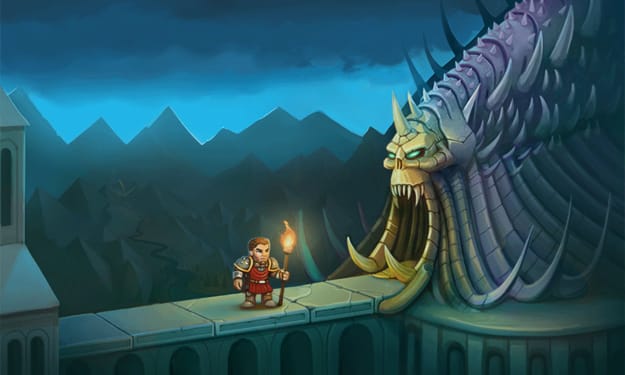'Loop Hero' is the Perfect Game for a Post-Covid World
This indie RPG takes the idea of rebuilding a decimated universe and turns it into a dungeon crawler that I can't stop playing.
While the title of this sophomore release from indie studio Four Quarters is appropriate, albeit bromide, I find it unfortunate that "Oblivion" is already a shopworn gaming trademark, as that is the word that keeps coming to mind as I loop my way closer and closer to 100 hours of game time.
Oblivion [uh-bliv-ee-uhn]: the state of being forgotten or completely unknown.
In Loop Hero, 2021's unexpected gaming success story, you are tasked with two simple actions:
- walk around
- remember
Remember? Remember what? Without going too deep into the lore, Loop Hero presents a dystopian future where the world has been, well, forgotten. Not erased, just disremembered, and only by exploring the wasteland and encountering things that were previously known can the Hero start to rebuild their forgotten universe. Four Quarters has effectively packaged these themes of memory and healing and released them to a public that is still reeling in a dystopia of our own, so it's no surprise that they've sold more than half a million copies of the title.
I bought Loop Hero the day it was released, not because I follow the publisher, and not even because I love roguelikes (we'll define this genre in a moment), although I have spent a shameful amount of hours playing Ancient Domains of Mystery (ADOM). Instead, something about this game just spoke to me, and it's one of the best decisions I've made this year. [Disclaimer: I haven't made many big decisions this year.]
Loop Hero isn't hard to understand, but it's hard to master. The Hero embarks on expeditions and is tasked with journeying as many times around the wasteland as possible before being overpowered by spiders, ratwolves, vampires, skeletons, and bosses. In the process, they (the Hero appears to be androgynous, a nice touch) collect resources that the player can use to build up their camp, generating more power for subsequent expeditions. The Hero tries to talk and reason with other wasteland wanderers, to no avail.

Loop Hero consists of four chapters, each progressively more challenging. Is the game worth the time I've invested? Is it the addictive nature of these run-based games that has me hooked, or is there something deeper to this indie phenomenon?
Before we adventure further down this trail of thought, it's worth taking a few minutes to explain what "roguelike" games are, and why they're so popular. (Warning: If you are a gamer, you may know all this, in which case skip ahead to the FINAL LOOP of this story.)
What are 'roguelike' games, and what's the appeal of dying over and over?
Roguelikes have been around for about four decades now, and in the gaming community, the genre is steeped in controversy. Roguelikes are named after a 1980 dungeon crawler called Rogue invented by two computer programmers at the University of California Santa Cruz. It was a simple game with a simple premise: survive as many dungeons as you can before inevitably dying and starting over. If, by some miracle, you make it to the final dungeon and find the legendary Amulet of Yendor, then you must climb all the way back to the surface to claim victory. Few have accomplished that feat. This idea is the foundation of all roguelikes: "winning the game" is secondary to simply advancing as far as you can before being overwhelmed by increasingly challenging adversaries.

Since the '80s, roguelikes have fallen in and out of the "indie mainstream" (I realize that's oxymoronic) with avid gamers disputing the label being applied to any game that doesn't meet certain criteria, such as permanent death (or "permadeath," meaning you must start from scratch after each loss), procedurally-generated content (meaning every run is different), and turn-based action. Last year's "Game of the Year" contender, Hades, created by Supergiant Games, served as a catalyst to send the roguelike genre soaring back into the public eye, and consequently reignited the debate over what is actually a roguelike, and what is a "roguelite," as the mimics have come to be called.
By many of these standards, Loop Hero is not a roguelike, as death is not permanent and action is not turn-based. These trivialities may seem inconsequential to the casual reader, but trust me, there are Redditors who will die on this hill to preserve the legacy of the OG Rogue. As a casual gamer myself, I see no need to distinguish roguelikes from roguelites, and prefer instead to call any procedurally-generated dungeon crawler a "roguelike." (I am not, however, brave enough to share this opinion on Reddit).
For those who skipped ahead, here's the FINAL LOOP of the story:
If there are hundreds of roguelike games out there, why play Loop Hero?
What makes this game special?

Loop Hero manages to be more than a repetitive auto-battler, and it's not just because it fuses deck-building, role-playing, city-planning, strategy, and "second-monitor" gaming into one multi-genre title that has been called "a pain in the arse but in the best possible way." It's not just because it follows in the footsteps of Bastion, Darkest Dungeon, and Hades to infuse story and lore into an endlessly replayable, well, loop. It's not just because, at the core of this admittedly simple yet somehow impossible-to-explain-to-my-girlfriend phenomenon is a spa-like, soul-cleansing experience where players simultaneously don the hats of Fighter, Dungeon Master, and Twitch viewer.
Loop Hero manages to be all this and more through no success of its creators, although to be clear, my afore-mentioned hats are off to the gentlefolk at Four Quarters — consider me liked and subscribed. No, it's not due to any rare ingenuity from these presumably bored Russians who pieced together 14 different genres and called it a game that I'm about to hit 65 hours in a title I picked up for $11.99. In fact, based on interviews with Aleksandr Goreslavets, who wrote, designed, and composed the game, it's safe to say that any philosophical or darkly serendipitous parallels between the game world and the real world were, at best, a happy accident:
[We wanted to] just have fun gameplay. You don't have any idea about story. But then we decided, OK let's put some background for it. ... OK, maybe the end of the world happened, and we need to figure out what's happened, why the Hero can build some lands around him but he's not a god or something. OK, maybe he's not really building it, maybe he's remembering them. And in in this way we created the basic story.
OK, clearly Loop Hero wasn't designed to be a lovecraftian homage to the year 2020. To some this may be disappointing, but I choose to view it as another miraculous element to the commercial and metaphysical success of this title. After all, when a game developer goes on record saying:
[We wanted to] just have fun gameplay
and then drops in-game Nietzschean bombshells like:
Tell me, is it true that it's God who is destroying this world?
well, I refuse to exist in a state of mind where that just happened by chance. Nietzsche be damned.
Loop Hero is a game about walking in a circle — an increasingly troubling circle. And, as someone who has spent a year walking in an increasingly troubling circle around my living room, while disease and death raged all around, I discovered in Loop Hero a sense of familiarity, solidarity, and, somehow, peace.
Perhaps I'm going crazy. Perhaps I'm fabricating this baroque metaphor as an act of desperation, grasping and clinging to anything that resembles an answer to the question ironically asked by our Hero early in the game:
"Where am I? Everything looks different now..."
Because it's true. In a post-Covid world, everything does look different. Much like our Hero, we find ourselves on long walks around our neighborhoods, our cities, and our parks, not just re-familiarizing ourselves with the topography but actually remembering and stitching together the tapestry-like realities of before and after this pandemic. Our world has been torn apart, not by a demonic Lich, but by an unforgiving virus, and we are left with the mountainous task of existing in a fragmented oblivion.

I set out on an adventure today, an adventure to write a review of a game that my girlfriend says is "consuming my life," or whatever. She's probably right. Anyway, check out Loop Hero on Steam. It's more than just another repetitive roguelike, and unless you're afraid of losing your girlfriend, there's really no downside to entrusting 100 hours of your life to the guy who said:
[We wanted to] just have fun gameplay.
Because he's not wrong. It's fun. It's interesting. It's miraculously poetic and contains darkly troubling parallels to our post-Covid state of existence.
Mostly, it's just fun.

---
Joshua Luke Johnson is a senior content manager at Creatd and head of Content Moderation and Curation at Vocal.
About the Creator
Joshua Luke Johnson
Former Head of Content @ Vocal
Interview with Christopher Paolini: https://vocal.media/interview/christopher-paolini-interview-part-1-of-3
Enjoyed the story? Support the Creator.
Subscribe for free to receive all their stories in your feed. You could also pledge your support or give them a one-off tip, letting them know you appreciate their work.







Comments (1)
cool